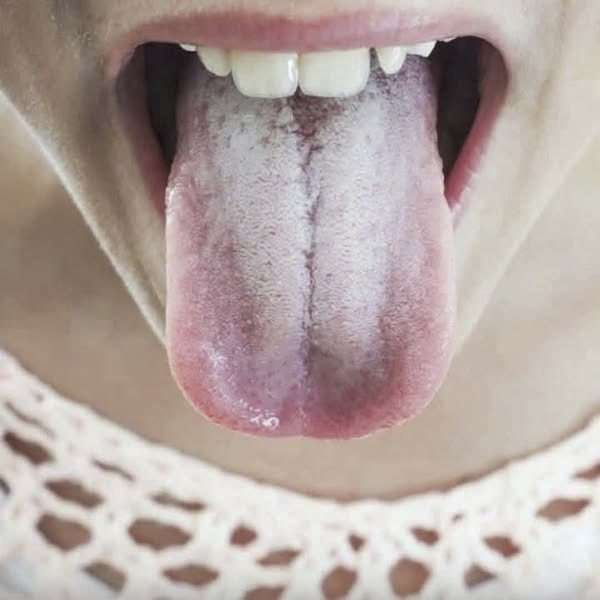What You Can Do:
Quitting smoking is the best course of action to improve both your oral and overall health. If you notice persistent white patches, consult a dentist or doctor to rule out precancerous changes.
5. Leukoplakia
Leukoplakia refers to the development of white or grayish patches on the tongue, gums, or inside the cheeks. While it’s usually benign, leukoplakia can sometimes progress to oral cancer if left untreated. It’s often associated with tobacco use, chronic irritation, or ill-fitting dentures.
What You Can Do:
Visit your dentist or physician for evaluation if you notice unexplained white patches. They may recommend monitoring the area or performing a biopsy to ensure there’s no risk of malignancy.
6. Geographic Tongue
Geographic tongue is a harmless condition where irregular red patches with white borders appear on the tongue, giving it a map-like appearance. The exact cause is unknown, but it’s thought to be linked to stress, hormonal changes, or vitamin deficiencies.Ezoic
What You Can Do:
While geographic tongue doesn’t require treatment, avoiding spicy or acidic foods may reduce discomfort. If symptoms worsen or persist, consult a healthcare provider.
7. Lichen Planus
Lichen planus is an inflammatory condition that can affect the skin and mucous membranes, including the mouth. On the tongue, it may present as lace-like white lines or patches. Its cause is unclear, but it’s believed to involve an immune system response.
What You Can Do:
If you suspect lichen planus, visit your doctor or dentist for diagnosis and management. Treatments may include corticosteroids or other medications to alleviate symptoms.Ezoic
8. Syphilis
In rare cases, a white tongue may be a sign of syphilis, a sexually transmitted infection caused by the bacterium Treponema pallidum . One of its early oral manifestations is a painless sore or patch on the tongue.
What You Can Do:
If you have unprotected sexual contact and notice unusual symptoms, including a white tongue, seek testing and treatment immediately. Early-stage syphilis is treatable with antibiotics.
9. Nutritional Deficiencies
Deficiencies in certain vitamins and minerals, particularly B vitamins (like B12), iron, or folate, can contribute to a white tongue. These nutrients play vital roles in maintaining healthy mucous membranes and preventing inflammation.Ezoic
What You Can Do:
Ensure a balanced diet rich in fruits, vegetables, lean proteins, and whole grains. If dietary adjustments aren’t enough, consider taking supplements under the guidance of a healthcare provider.
10. Other Systemic Conditions
A white tongue can occasionally signal systemic issues such as autoimmune diseases, gastrointestinal disorders, or even HIV/AIDS. In these cases, the tongue’s appearance may be accompanied by additional symptoms like fatigue, weight loss, or recurrent infections.
What You Can Do:
If you experience persistent or worsening symptoms alongside a white tongue, consult a healthcare professional for comprehensive evaluation and testing.
see continuation on next page
